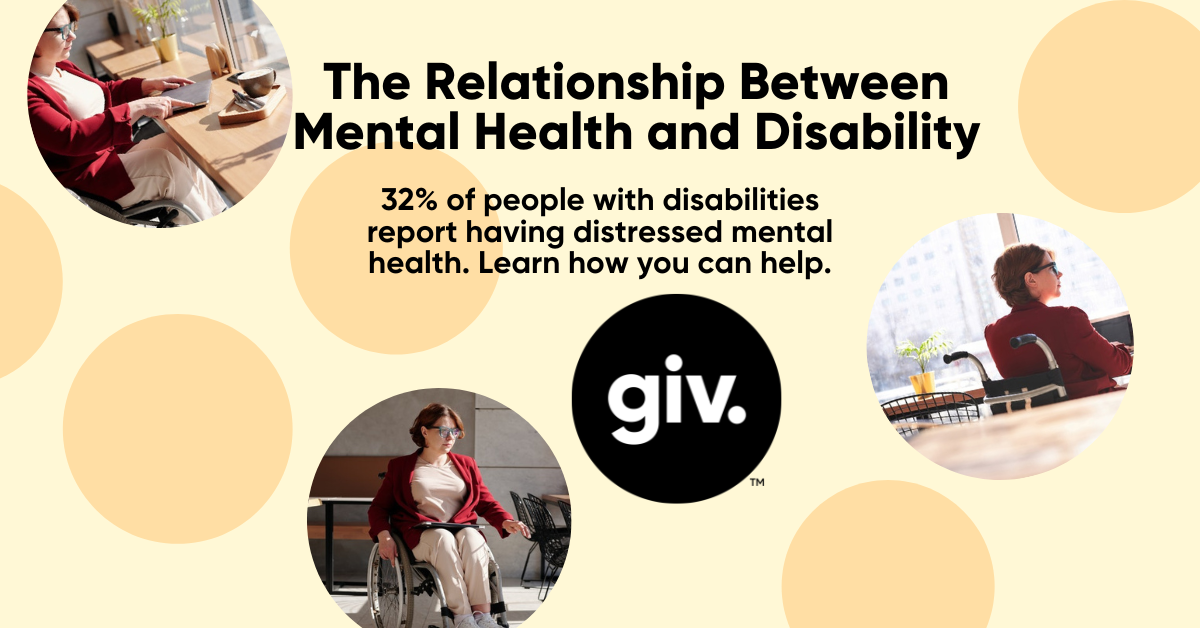May is Mental Health Awareness Month, so it’s appropriate to take the time to explore the relationship between mental health and disability as there is a huge correlation between the two. Mental health can impact all individuals but those with disabilities have reported having distressed mental health five times more than adults without disabilities.
The Relationship Between Mental Health and Disability
In everyday life, the relationship between mental health and disability plays a significant role in the well-being of individuals. Understanding this connection is crucial for providing effective care and support to those with intellectual and developmental disabilities. This blog post will delve into the intricacies of mental health and disability, shedding light on how these two aspects intersect and impact each other.
Mental Health and Disability
Mental health and disability are intertwined in various ways, influencing the daily lives of individuals with disabilities. The presence of a disability can often lead to mental health concerns, such as anxiety disorders, depression, or post-traumatic stress disorder (PTSD). Conversely, individuals experiencing mental health conditions may also face challenges related to physical or mental impairment, affecting their ability to engage in everyday activities.
Understanding Mental Health
Before delving deeper into the relationship between mental health and disability, it’s essential to grasp the concept of mental health itself. Mental health refers to a person’s emotional, psychological, and social well-being. It encompasses how individuals think, feel, and behave, influencing their ability to cope with stress, relate to others, and make decisions. Mental health is just as important as physical health and plays a significant role in overall well-being.
The Impact of Mental Disorders
Mental disorders can manifest in various forms, ranging from mild to severe. Common mental illnesses include major depressive disorder, anxiety disorders, bipolar disorder, and schizophrenia, among others. These conditions can significantly impair an individual’s ability to function in daily life, affecting their relationships, work, and overall quality of life. For individuals with disabilities, the presence of a mental disorder can exacerbate existing challenges, making it essential to address both physical and psychological needs.
Addressing Mental Health Concerns
Identifying and addressing mental health concerns is crucial for individuals with disabilities. Mental health symptoms may manifest differently in this population, requiring specialized care and support. Caregivers, healthcare providers, and behavioral health specialists play a vital role in recognizing and addressing mental health issues among individuals with disabilities. Implementing a comprehensive mental health treatment plan tailored to the individual’s needs can help alleviate symptoms and improve overall well-being.

Access to Mental Health Services
Access to mental health services is essential for individuals with disabilities to receive the care they need. However, many face barriers to accessing appropriate care, including limited resources, stigma, and lack of awareness. It’s essential to advocate for accessible mental health services and support systems that cater to the unique needs of individuals with disabilities. This includes providing accommodations, such as accessible facilities and communication support, to ensure equitable access to care.
The Importance of Mental Health Screening
Regular mental health screening is vital for early detection and intervention among individuals with disabilities. Screening tools can help identify mental health concerns and facilitate timely referrals to appropriate services. Caregivers and healthcare providers should incorporate mental health screening into routine assessments to ensure comprehensive care for individuals with disabilities. By identifying mental distress early on, interventions can be implemented to prevent further escalation of symptoms.
Promoting Emotional Health
Promoting emotional health is essential for individuals with disabilities to thrive in their daily lives. This includes fostering positive relationships, building resilience, and providing opportunities for social engagement. Caregivers and support services play a crucial role in creating a supportive environment that nurtures emotional well-being. Encouraging participation in meaningful activities and providing emotional support can enhance quality of life and reduce mental distress.
Addressing Stigma and Discrimination
Stigma and discrimination surrounding mental health and disability can have detrimental effects on individuals’ well-being. It’s essential to challenge stereotypes and promote inclusivity and acceptance within society. Educating the public about mental health and disability can help dispel myths and misconceptions, fostering a more supportive and understanding community. By addressing stigma and discrimination, we can create a more inclusive society where individuals with disabilities feel valued and respected.
Supporting Mental Health in Everyday Life
Supporting mental health in everyday life involves a holistic approach that addresses physical, emotional, and social needs. This includes access to healthcare, supportive services, and opportunities for meaningful participation in society. Caregivers, healthcare providers, and community organizations play a vital role in providing ongoing support and advocacy for individuals with disabilities. By working together, we can create a more inclusive and supportive environment that promotes mental health and well-being for all.
Prevalence of Mental Health Distress with Disabilities:
Frequent mental distress is defined as having 14 or more mentally unhealthy days within a 30 day period. A 2018 study by the CDC found that 32.9% of people with disabilities reported having mental distress, which was 4.7 times greater than adults without disabilities, whose reported findings were at 7.2%. 55% of adults with both physical and intellectual disabilities reported having mental distress, making them the highest at-risk group reported in this study.

Causes of Mental Health Struggles in Those with Disabilities:
Mental health issues can stem from a myriad of social, physical, and emotional factors. Many individuals with disabilities report feeling ostracized by society because people often devalue and limit the potential of individuals with disabilities. This practice is referred to as ableism, where non-disabled individuals knowingly or unknowingly say or do things that make disabled people feel inferior to them.
Other reported issues were that many mental health practitioners view disability as the issue to be fixed and believe that if the individual could fix their disability they would not have mental distress. Therefore they don’t take the person’s mental health concerns seriously.
Poverty is another risk factor for individuals with disabilities and their mental health. It’s found that less than 20% of people with disabilities are employed members of the workforce. Individuals with disabilities are twice as likely to experience poverty, or be homeless. People with disabilities make up 40% of the homeless population. It is easy to conclude that those with disabilities would have increased mental distress when a large portion of this population is unable to meet their most critical basic needs.
How You Can Make a Difference:
If you want to make a difference in improving the mental health of disabled individuals, there is plenty of work to be done in your own circles and communities. Small things you can do that make a huge difference are:
- Use inclusive language when speaking about individuals with disabilities.
- Learn about people with invisible disabilities and how you can be their ally.
- Look disabled people in the eyes and speak to them like they’re your peers (because they are!)
- Don’t patronize people with disabilities.
- Smile and talk to disabled employees when you are grocery shopping or running errands around town.
- Be a consistent caregiver for someone with a disability. Caregiver turnover is high and for people with disabilities and this can add to their mental distress. Being a consistent person in their life can help reduce these challenges.

Conclusion
In conclusion, the relationship between mental health and disability is complex and multifaceted. Individuals with disabilities often face unique challenges related to mental health, requiring specialized care and support. By addressing mental health concerns and promoting emotional well-being, we can enhance the quality of life for individuals with disabilities and create a more inclusive society. Through advocacy, education, and collaboration, we can work towards a future where mental health and disability are understood, accepted, and supported by all.
If you liked this post, The Relationship Between Mental Health and Disability, you might also like:
- What Are Invisible Disabilities?
- Inclusive Language for Disabilities
- How to be a Compassionate Caregiver
Sources:
Centers for Disease Control and Prevention. (2020, September 10). Frequent mental distress among adults, by disability status, disability type, and selected characteristics – United States, 2018. Centers for Disease Control and Prevention. Retrieved May 6, 2022, from here.
Diament, M. (2009, July 20). More than two-fifths of homeless have disabilities. Disability Scoop. Retrieved May 6, 2022, from here.
National Alliance on Mental Illness. (n.d.). People with disabilities. NAMI. Retrieved May 6, 2022, from here.






